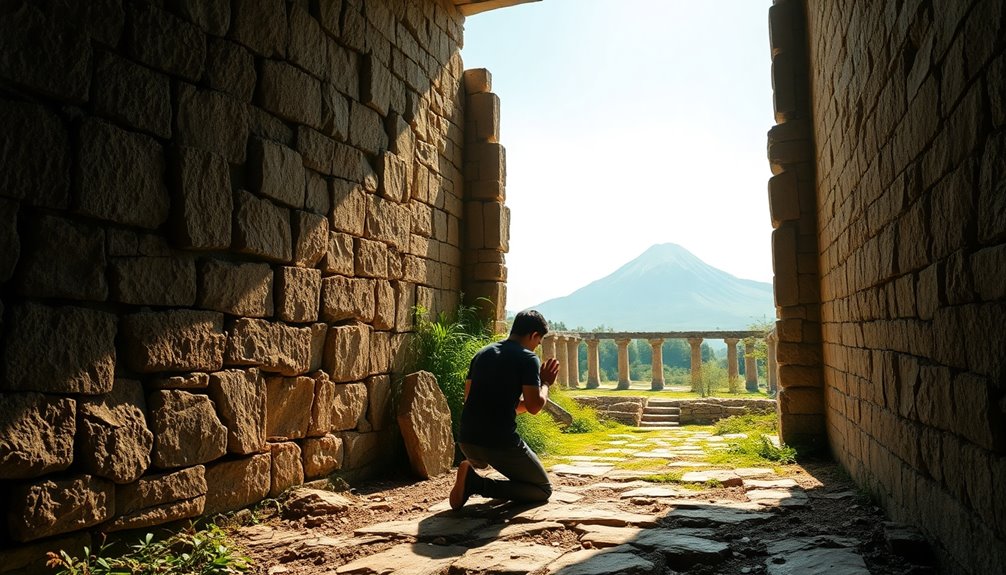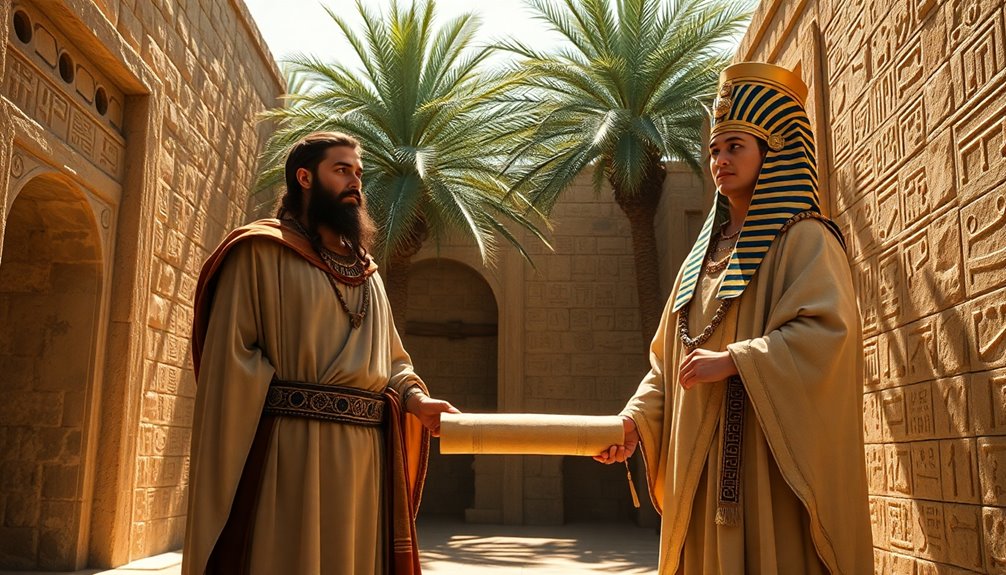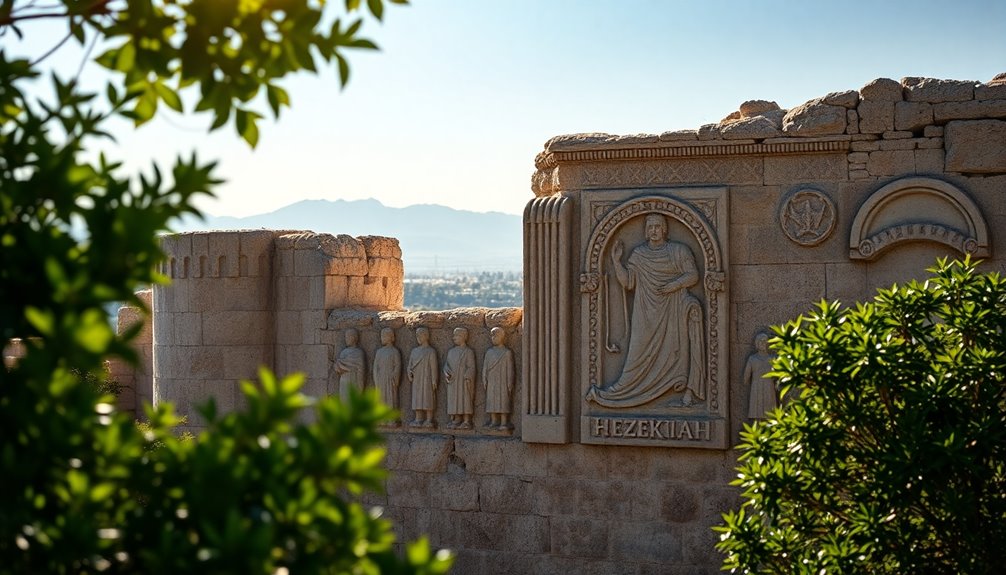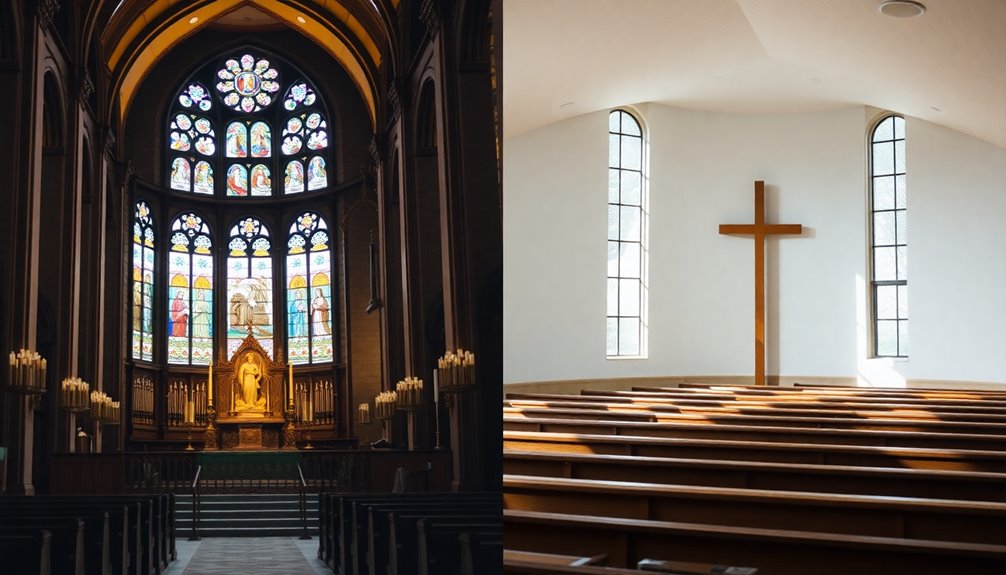Hezekiah was a significant king of Judah, reigning from 715 to 686 BC. You'll find that he took the throne at just 25 years old and was known for his deep faith in God. He actively dismantled pagan worship and restored temple practices, which sparked a spiritual revival among his people. During the Assyrian siege, Hezekiah prayed earnestly for deliverance, leading to miraculous victories. His efforts not only fortified Jerusalem but also reinforced religious traditions that resonate today. For a deeper understanding of his remarkable life and legacy, you might explore more intriguing aspects of his reign.
Key Takeaways
- Hezekiah was a significant king of Judah, ruling for 29 years from 715 to 686 BC, known for his profound faith and religious reforms.
- He initiated major religious reforms, dismantling pagan altars and restoring temple worship, influencing Jewish practices and the observance of Passover.
- During the Assyrian invasion in 701 BC, Hezekiah demonstrated unwavering faith, seeking divine intervention through prayer and the prophet Isaiah.
- His prayers resulted in miraculous events, including the healing from illness and the defeat of 185,000 Assyrian soldiers.
- Hezekiah's legacy includes national unity and spiritual revival, with key biblical accounts found in 2 Kings 16-20 and Isaiah 36-39.
Introduction

Hezekiah stands out as one of the most significant kings of Judah, reigning for 29 years from around 715 to 686 BC. Ascending to the throne at just 25, Hezekiah quickly became known for his profound faith and commitment to reforming religious practices in Jerusalem. He took decisive action against pagan altars, restoring temple worship and ensuring that the people of Judah turned back to God.
Amidst his reforms, Hezekiah faced a formidable threat from the Assyrian Empire. King Sennacherib's invasion in 701 BC tested his leadership and faith. Rather than succumbing to fear, Hezekiah exemplified courage, relying on his relationship with God for guidance and strength. His alliance with the prophet Isaiah provided encouragement during these turbulent times.
Hezekiah's unwavering faith was pivotal in seeking divine deliverance from the Assyrians, leading to a miraculous victory that saw 185,000 enemy soldiers defeated overnight.
Despite his achievements, his legacy also includes the birth of Manasseh, who later became one of Judah's most notorious kings. Through trials and triumphs, Hezekiah's reign remains a compelling chapter in the history of Judah.
Hezekiah's Prayer for Deliverance

When you look at Hezekiah's prayer for deliverance, you'll find it recorded in 2 Kings 19, where he earnestly calls on God during the Assyrian siege of Jerusalem.
This prayer not only highlights his faith but also God's sovereignty over dire situations.
As we explore the primary and secondary biblical references, you'll see how this moment reflects divine intervention in response to genuine supplication.
Primary Bible References
In 2 Kings 19:19, you'll find Hezekiah's heartfelt prayer for deliverance, where he acknowledges God's sovereignty while pleading for protection against the looming Assyrian threat. As king of Judah, Hezekiah faced the powerful Assyrians under King Sennacherib, who sought to conquer Jerusalem.
In his prayer, Hezekiah emphasized his reliance on God's power, asking for the defeat of the Assyrians and their king.
God responded to Hezekiah's earnest prayer by sending the prophet Isaiah to reassure him that Jerusalem wouldn't fall to the Assyrians (2 Kings 19:32-34). This moment was crucial during Hezekiah's reign, highlighting his faith and commitment to seeking divine intervention.
The miraculous outcome followed when God sent an angel who struck down 185,000 Assyrian soldiers in a single night, leading to their retreat from Jerusalem (2 Kings 19:35).
This event not only illustrates God's protective hand over His people but also showcases the importance of Hezekiah's prayer in a time of crisis. Through his faith, Hezekiah experienced God's deliverance, solidifying his legacy as a king who trusted in divine power.
Secondary Bible References
The account of Hezekiah's prayer for deliverance showcases the profound impact of earnest supplication in dire circumstances. When faced with the looming threat of the Assyrians, Hezekiah turned to God, emphasizing His sovereignty and seeking help in 2 Kings 19:19. His heartfelt prayer acknowledged the mockery of the Assyrians against the Lord, revealing Hezekiah's deep reliance on divine intervention for Judah's survival.
In response, God assured Hezekiah through the prophet Isaiah that Jerusalem would be spared and the Assyrians wouldn't enter the city (2 Kings 19:32). This assurance highlighted Hezekiah's faithfulness and trust in God.
Following his earnest prayer, a miraculous victory unfolded as God sent an angel to defeat 185,000 Assyrian soldiers during the night, leading to the enemy's swift retreat (2 Kings 19:35).
This episode not only illustrates Hezekiah's unwavering faith but also demonstrates God's willingness to respond to the earnest pleas of His people. In times of crisis, Hezekiah's example reminds you of the power of prayer and the importance of trusting in God's deliverance.
Assyrian Siege of Jerusalem

Facing a formidable threat, King Hezekiah found himself in a dire situation during the Assyrian siege of Jerusalem in 701 BC. The Assyrian Empire, led by King Sennacherib, had already conquered the northern kingdom of Israel, leaving Hezekiah to prepare for an attack. He fortified Jerusalem's defenses by strengthening its walls and constructing additional towers, determined to protect his people.
In his quest for divine guidance, Hezekiah consulted the prophet Isaiah. Isaiah assured him that God would protect Jerusalem, promising that the Assyrians wouldn't enter the city. Trusting this message, Hezekiah turned to prayer, pleading for deliverance from the looming threat.
God responded to Hezekiah's earnest prayer in a miraculous way. An angel was sent to defeat 185,000 Assyrian soldiers in a single night, causing the Assyrian army to retreat from Jerusalem. This stunning victory is recorded in 2 Kings 19:35, emphasizing God's faithfulness and intervention.
Hezekiah's reliance on God during the siege not only showcased his leadership but also highlighted the power of faith in overcoming insurmountable odds.
Hezekiah's Faith Amid Crisis

Demonstrating unwavering faith during one of Judah's darkest hours, Hezekiah turned to God for guidance and strength amid the Assyrian invasion. In the face of this crisis, he sought the counsel of the prophet Isaiah and earnestly prayed for divine intervention. His heartfelt prayer for deliverance underscored his reliance on God, emphasizing His sovereignty and power (2 Kings 19:19).
Hezekiah's commitment to following God's commands and prioritizing worship played a crucial role in his faith journey. As a result of his sincere prayer and steadfast faith, God responded dramatically. An angel was sent to defeat 185,000 Assyrian soldiers in a single night, leading to the miraculous retreat of the enemy from Jerusalem (2 Kings 19:35).
This incredible act of divine intervention showcases how Hezekiah's faithfulness during a national crisis led to extraordinary outcomes. His story serves as a powerful reminder of the strength found in prayer and faith, especially when confronting overwhelming challenges.
Through Hezekiah's experience, you can see how trusting in God can lead to deliverance and hope, even in the direst of situations.
Hezekiah's Alliance With Egypt

When you think about Hezekiah's alliance with Egypt, it's easy to see why some misconceptions arise.
Many assume this partnership was a wise move, but historical accuracy reveals a different story.
Understanding the context helps clarify why relying on Egypt ultimately fell short against the Assyrian threat.
Debunk Common Misconceptions
There's a common misconception that King Hezekiah formed an alliance with Egypt during his reign, but this couldn't be further from the truth. In reality, Hezekiah prioritized his trust in the Lord over forming alliances with foreign powers. When faced with the threat of Assyria, he didn't seek help from Egypt; instead, he focused on strengthening Jerusalem's defenses and relied on God for protection (2 Kings 18:5-7).
Hezekiah's spiritual reform was pivotal during this time, as he encouraged the southern kingdom of Judah to turn back to God. He believed that faithfulness to the Lord was key to their security, as emphasized by the prophet Isaiah, who warned against seeking alliances with foreign nations (Isaiah 30:1-2).
The biblical accounts highlight Hezekiah's unwavering trust in God, especially during the Assyrian siege (2 Kings 19:19). The misconception may arise from the broader context of neighboring nations during this period.
However, Hezekiah's commitment to God first and his focus on spiritual reform set him apart, illustrating that his reliance was solely on divine intervention rather than on political alliances.
Historical Accuracy Concerns
Historical narratives often grapple with the complexities of faith and politics, particularly in the case of King Hezekiah's alliance with Egypt. Hezekiah sought to solidify Judah's defenses against the looming Assyrian threat by forming this alliance, despite the dire warnings from the prophet Isaiah (Isaiah 30:1-5).
Critics argue that this reliance on Egypt reflected a lack of faith in God's protection, a sentiment echoed in prophetic writings (Isaiah 31:1).
From a historical accuracy standpoint, it's intriguing that Assyrian records make no mention of Hezekiah's alliance with Egypt. This omission raises questions about the significance and actual impact of the alliance on Judah's political landscape.
Ultimately, the alliance proved ineffective, as the Assyrians continued their military campaigns unabated, illustrating a broader theme within biblical narratives: the tension between faith and political expedience.
Faith During Personal Trials

When you face personal trials, like Hezekiah did during his illness, trusting God can make all the difference.
His prayers not only brought healing but also showcased the power of community resilience when he sought guidance during the Assyrian siege.
In moments of adversity, Hezekiah's faith reminds you that reliance on God can lead to miraculous outcomes.
Trusting God in Adversity
Trusting God during adversity can feel daunting, yet it's in these challenging moments that faith often shines brightest. Hezekiah faced one of his greatest trials during the Assyrian invasion, a seemingly insurmountable challenge. Instead of succumbing to fear, he turned to God, demonstrating unwavering faith and reliance on divine assistance.
He sought the counsel of the prophet Isaiah, understanding that only God could deliver Jerusalem from destruction. In a heartfelt prayer, Hezekiah acknowledged God's sovereignty, pouring out his concerns and pleading for deliverance (2 Kings 19:19).
His faithfulness didn't go unnoticed; God responded to Hezekiah's earnest prayer with a miraculous intervention. An angel was sent, defeating 185,000 Assyrian soldiers overnight (2 Kings 19:35). This extraordinary event showcases the power of trusting God in adversity.
Hezekiah's reliance on God serves as a powerful example for you. When faced with personal trials, remember that your faith can lead to divine assistance.
Like Hezekiah, you can find strength in prayer, knowing that God is faithful and capable of remarkable deliverance in your life. Trusting God not only transforms your perspective but also opens the door for His miraculous work.
Community Resilience in Adversity
In times of crisis, communities often rally together, drawing strength from shared faith and experience. Hezekiah faced the daunting Assyrian invasion in 701 BC, yet his resilience shone through his unwavering faith.
By seeking guidance from the prophet Isaiah, you can see how vital spiritual counsel is during personal trials. Hezekiah's heartfelt prayer for protection revealed his deep trust in God's sovereignty, showcasing the power of prayer as a means to overcome adversity.
When God miraculously delivered Hezekiah and the people of Judah from the Assyrians, it illustrated the rewards of faithfulness. This divine intervention not only saved lives but also inspired national unity and sparked a spiritual revival among the people.
The story of Hezekiah teaches us that in our darkest moments, our faith can bond us together, fostering resilience within our communities.
Hezekiah's Legacy Endures Today

Celebrating Hezekiah's legacy reveals the profound impact he'd on religious practices and infrastructure that still resonate today. His significant religious reforms, including the destruction of pagan idols and the restoration of the Temple in Jerusalem, laid a foundation for future generations to prioritize the worship of Yahweh.
You can see how his successful prayer for deliverance from the Assyrian invasion, which led to the miraculous defeat of 185,000 soldiers, serves as a powerful testament to faithfulness and reliance on God, inspiring believers even now.
Hezekiah's efforts to establish a national observance of Passover and reinstate the Levitical priesthood sparked a spiritual revival in Judah, influencing Jewish religious practices that persist in modern traditions.
His leadership also extended to infrastructure, most notably with the construction of the Siloam Tunnel, which provided essential water supply to Jerusalem. This advancement not only showcased his commitment to the city's welfare but also emphasized the importance of planning and resourcefulness.
Ultimately, Hezekiah's story remains a vital part of religious education, exemplifying divine intervention and the importance of seeking God during crises, ensuring that his legacy endures through generations.
Additional Resources

For those eager to dive deeper into the life and legacy of Hezekiah, a wealth of resources awaits you. Start with the biblical texts, particularly 2 Kings 16-20 and Isaiah 36-39. These passages detail Hezekiah's reign as king of Judah, highlighting his religious reforms and unwavering faithfulness to God.
You'll discover how he removed pagan idols and reopened the Temple in Jerusalem, which his father, King Ahaz, had closed. To understand the context of his leadership, explore historical accounts of the Assyrian invasion under King Sennacherib. Hezekiah's prayer during this crisis led to divine deliverance, emphasizing the power of faith in dire times.
You can find more insights through commentaries and scholarly articles that analyze Hezekiah's reforms and their impact on Judah's spiritual revival, including the reinstatement of the national observance of Passover. Additionally, consider visiting archaeological sites related to Hezekiah, like the Siloam Tunnel, which showcases his engineering achievements.
Engaging with these resources will enrich your understanding of Hezekiah's significant contributions and the enduring legacy he left behind in both faith and governance.
Frequently Asked Questions
Who Was Hezekiah in the Bible and What Did He Do?
Hezekiah was a king who made significant changes during his reign, like cleaning up the Temple and bringing back the Passover celebration.
You'd see him facing the Assyrian Empire, where he bravely sought divine help, leading to a miraculous victory.
Later, he dealt with a serious illness that God extended his life from.
However, you'd notice his mistake when he showed treasures to Babylonian envoys, which foretold trouble for Judah.
What Does the Bible Say About Hezekiah?
The Bible describes Hezekiah as a king who passionately followed God, initiating major religious reforms in Judah.
You'll find that he removed pagan worship and restored the observance of Passover, fostering a spiritual revival.
When faced with the Assyrian threat, his fervent prayers led to miraculous deliverance. He also experienced personal healing, with God extending his life.
However, he erred by revealing his treasures to Babylon, leading to a dire prophecy for Judah.
Why Did God Add 15 Years to Hezekiah?
God added 15 years to Hezekiah's life in response to his heartfelt prayer for healing.
When you seek God earnestly, like Hezekiah, you're reminded that your faithfulness matters.
This extension wasn't just for health; it served as a sign that God would protect Jerusalem from the Assyrians.
During those extra years, Hezekiah continued to reform and strengthen his kingdom, demonstrating how divine intervention can lead to significant changes in one's life.
What Did Hezekiah Prayed For?
When you think about what Hezekiah prayed for, consider his urgent pleas for divine help during crises.
He asked God for deliverance from the Assyrian threat, recognizing their challenge to God's authority.
You can see his deep faith as he sought healing when he fell seriously ill, requesting an extension of his life.
In both situations, he demonstrated reliance on God's power and mercy, which ultimately led to miraculous outcomes.










